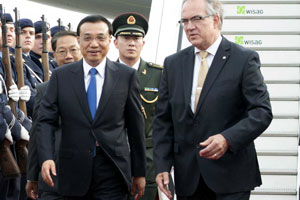Modi, Cameron to address Australian parliament during G20 trip
(Xinhua) Updated: 2014-10-28 16:55CANBERRA - The leaders of India and Britain will address the Australian parliament next month, as part of their trip to the Group of 20 summit, Prime Minister Tony Abbott said on Tuesday.
British Prime Minister David Cameron will deliver his speech to the lawmakers on Nov 14, followed by Indian Prime Minister Narendra Modi on Nov 18.
It will be the first visit to Australia by an Indian premier in 28 years, and the first time an Indian leader has addressed the parliament.
The G20 summit, to be held on Nov 15-16 in Brisbane, will bring delegations from across the world, including the United States, Argentina, Russia, South Africa and Turkey.
Some leaders, including Modi, Cameron, French President Francois Hollande and German Chancellor Angela Merkel, have scheduled visits to other cities during their stay.
Prime Minister Abbott said the visits would be an opportunity to strengthen some of Australia's most crucial international relationships.
"It's a chance to showcase our country and to promote jobs and growth with the leaders of the world's largest and most representative economies," he said.
"These leaders represent two-thirds of the world's population and some 85 percent of the world's gross domestic product."
Cameron will also visit Sydney during his stay, while the parliament will be recalled on Nov 18 to hear from Modi, who will also visit Sydney and Melbourne.
Hollande, on his first tour to Australia, will visit Brisbane, Sydney and Canberra. Merkel will follow up the G20 summit with a visit to Sydney.
Meanwhile, a report has emerged from Brisbane that citizens and peaceful protesters, who are unaware of special new police powers, risk being caught up in mass arrests during the G20 summit.
The Queensland council for civil liberties (QCCL) has warned that the police powers include the right to demand identification and search people without cause for suspicion in an area covering most of inner-city Brisbane.
QCCL President Michael Cope said the council was concerned that while media attention is focused on the specter of violent protests from anarchist groups, there had been little publicity surrounding the police powers.
He said this could lead to a repeat of the mass arrests at the Toronto G20 summit in 2010, where simple non-compliance with those extraordinary powers was a factor contributing to the 1,100 arrests made.
"One of the reasons for the many arrests in Toronto is that people didn't know the full extent of police powers and as a result many people assuming the police still had their ordinary powers refused to comply," he said.
Assistant police commissioner Katarina Carroll was quoted by the Brisbane Courier-Mail as saying officers would "take swift and decisive action, should anyone damage public or private property, or violence is incited within a protest environment."
But at a press conference on Tuesday, Carroll dismissed claims by the QCCL that photographs of protesters would be shared with the leading intelligence agency, ASIO, the Department of Immigration and possibly foreign intelligence services.










